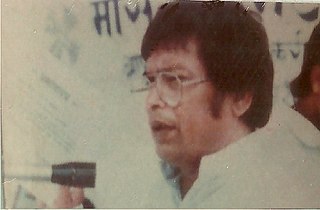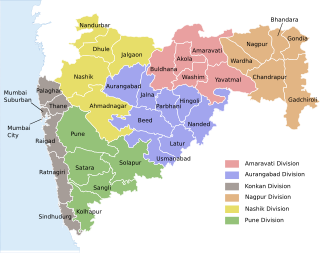
The Bahujan Samaj Party (BSP) is a national political party in India. By vote share in the 2014 general election, it is India's third-largest national party, though it did not win any seats in the Lok Sabha. It was formed to represent Bahujans, referring to Scheduled Castes, Scheduled Tribes and Other Backward Castes (OBC), along with religious minorities. According to Kanshi Ram, when he founded the party in 1984, the Bahujans comprised 85 percent of India's population, but were divided into 6,000 different castes. The party claims to be inspired by the philosophy of Gautama Buddha, B. R. Ambedkar, Mahatma Jyotiba Phule, Narayana Guru, Periyar E. V. Ramasamy and Chhatrapati Shahuji Maharaj. Kanshi Ram named his protégée Mayawati as his successor in 2001. The BSP has its main base in the Indian state of Uttar Pradesh. In the 2017 Uttar Pradesh elections, BSP was the second-largest party, with over 22% of votes despite winning only 19 seats. It has an elephant as its election symbol. The BSP has no separate youth wing ; instead at least 50 percent of its organizational structure is from the youth. BSP has no social media accounts or website. Sudhindra Bhadoria, a senior party leader, is the only official spokesperson of the BSP.
Mumbai North Central Lok Sabha constituency is a Lok Sabha (parliamentary) constituency of Maharashtra state in western India.

Rakhi Sawant is an Indian dancer, model, Hindi film and television actress and television talk show host, who has appeared in many Hindi and a few Kannada, Marathi, Odia, Telugu and Tamil films. She was a contestant on the first season of the controversial Indian reality television series Bigg Boss 1 in 2006. Throughout her career, she has established herself as a sex symbol.

Ramdas Bandu Athawale is an Indian politician from Maharashtra. He is the president of the Republican Party of India (A). Currently, he is Minister of State for Social Justice and Empowerment in the Narendra Modi government, and represents Maharashtra in the Rajya Sabha, the upper house of India's Parliament. Previously he was the Lok Sabha MP from Pandharpur.
Akola Lok Sabha constituency is one of the 48 Lok Sabha (parliamentary) constituencies in Maharashtra state in central India.
The Republican Party of India (Gawai) is a political party in India. It is a splinter group of the Republican Party of India. The leaders are Kerala Governor R.S. Gavai and his son Rajendra Gawai. It is a constituent of the previous ruling United Progressive Alliance. Its presence is limited to Maharashtra.
The Republican Party of India (Kamble) is a political party in India, a splinter group of the old Ambedkarite Republican Party of India. The leader of the party is B. C. Kamble. Its presence is limited to Maharashtra among Dalits.
The Republican Party of India (Khobragade) is a political party in India, a splinter group of the Republican Party of India and named for its leader, Rajabhau Khobragade. The National President is now Sunil Harishchandra Ramteke.
The Peoples Republican Party or Republican Party of India (Kawade) is a political party in India, a splinter group of the old B. R. Ambedkar Republican Party of India. The leader of the party is Prof. Jogendra Kawade. Its presence is limited to Maharashtra among Dalits. His party had supported Bharatiya Janata Party leader Nitin Gadkari in Maharashtra Legislative Council election.
The Republican Left Democratic Front (RiDaLoS) is a coalition of political parties in the Indian state of Maharashtra formed before the Maharashtra state assembly elections, 2009, in Maharashtra. The alliance was forged between 14 political parties and many other NGOs and non political groups as well as students organisations in Maharashtra Republican Left Democratic Front Popularly known as RIDALOS as an alternative to the existing coalitions in the state.

Raja Dhale is an Indian writer and activist, who was one the original members of the Dalit Panther, started in April 1972, alongside Namdeo Dhasal and Arun Krushnaji Kamble. He belongs to Republican Party of India and leads the Raja Dhale faction, after it split.

This is a partial list of the political families of Maharashtra state in India.

Anandraj Yashwant Ambedkar is an Indian politician. He is the national leader of the Republican Sena political party. His supporters occupied the Indu Mill land at Dadar in 2011 to highlight the long-pending demand for a national memorial of B. R. Ambedkar.
The Bahujan Republican Ekta Manch (BREM) is a regional political party from Maharashtra, India, led by Sulekha Kumbhare. It supported the United Progressive Alliance (UPA) in the 2014 general election, but extended its support to the National Democratic Alliance (NDA) before the 2014 Maharashtra Legislative Assembly election due to differences with the UPA leader Indian National Congress over seat distribution.

The Vanchit Bahujan Aghadi is an Indian political party founded by Prakash Ambedkar on 20 March 2018. It's ideology primarily emphasized on Constitutionalism, Ambedkarism, Secularism, Socialism and Progressivism and it forms alliance with the political parties those serve the Ideological objectives of VBA. The Vanchit Bahujan Aghadi registered political party since 15 March 2019, prior to Lok Sabha elections 2019. It is supported by the All India Majlis-e-Ittehadul Muslimeen along with nearly 100 small political parties and social organizations. Prakash Ambedkar is the supremo of Vanchit Bahujan Aghadi. Having declared all of it's candidates' names this political party is contesting all 48 seats in Maharashtra Lok Sabha elections 2019.













